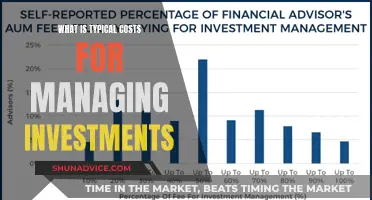
Goldman Sachs is a leading global investment banking firm that has been building up businesses that are more stable and annuity-like in comparison to the volatile earnings found in traditional investment banking. The investment management division has been an area of focus for Goldman Sachs in the wake of the financial crisis, and its performance has been steadily improving. The division is led by Tim O'Neill and Eric Lane, and has seen investment management revenues increase to $4.65 billion through the first nine months of the year, a record for the period. Assets under supervision hit $1.2 trillion, with net inflows of $41 billion during the quarter. Goldman Sachs Asset Management (GSAM) has also been acquiring leading institutional impact investing firms, such as Imprint Capital, to deepen its ability to deliver market-leading ESG and impact investment opportunities for clients.
What You'll Learn
- Goldman Sachs' investment management division has been a focus area since the financial crisis
- The division has seen a slow and steady improvement in performance
- The division's revenue increased to $4.65 billion in the first three quarters of the year
- The investment management division manages investments for insurers and pension funds
- The division has been successful in winning business from insurers

Goldman Sachs' investment management division has been a focus area since the financial crisis
Goldman Sachs is an American multinational investment bank and financial services company. It is the second-largest investment bank in the world by revenue and ranked 55th on the Fortune 500 list of the largest US corporations by total revenue.
Goldman Sachs' investment management division has been an area of focus for the company in the wake of the 2007-2008 financial crisis. The division has enjoyed success in winning business from insurers and via its global portfolio solutions business, which acts as an outsourced chief investment officer for pension funds and endowments.
The appeal of businesses like asset management is that they are more stable and annuity-like, in contrast to volatile earnings in sales and trading and traditional investment banking. The shift in emphasis is noticeable in the makeup of Goldman Sachs' revenues. Investment management made up around 17.5% of revenue through the first nine months of the year, up from 16.7% in the same period a year ago, and 12.5% for the first three quarters of 2009.
Goldman Sachs' investment management division offers integrated offerings across equity, fixed income, and multi-asset solutions, designed to help investors achieve their goals. The division focuses on turning global transformations into investing opportunities by combining specialized global alternatives expertise with the power of the Goldman Sachs network and insight.
The company's investment management division has been a key driver of the company's success, providing a stream of revenue that is likely to withstand the ups and downs of the market.
Investment Management: The Buy Side Advantage
You may want to see also

The division has seen a slow and steady improvement in performance
The Goldman Sachs Investment Management Division has seen a slow and steady improvement in performance, with a focus on building stable businesses that provide a consistent stream of revenue. The division's performance has stood out, even during periods of market volatility and disappointing earnings for the bank as a whole.
The investment management division's revenues have shown a steady increase, reaching a record $4.65 billion in the first three quarters of one notable year. This improvement has been driven by a diverse set of institutional and individual clients, including insurers, pension funds, and endowments. The division has been successful in attracting and managing a significant amount of assets, with Assets Under Supervision (AUS) surpassing $1.2 trillion, and net inflows of $41 billion in a single quarter.
The division's performance has been an area of focus for Goldman Sachs, particularly in the wake of the financial crisis. The appeal of businesses like asset management within the division lies in their stability and annuity-like revenue streams, which provide a balance to the volatile earnings often associated with investment banking and trading. As a result, investment management has become an increasingly significant contributor to Goldman Sachs' overall revenue, accounting for 17.5% in the first three quarters of the year, up from 16.7% and 12.5% in the same periods of the previous years.
The division's success can be attributed to its ability to provide investment management solutions across all major asset classes and its commitment to integrity and transparency. By combining traditional and alternative investments, the division offers a dedicated partnership focused on long-term performance. The diverse team of professionals within the division plays a crucial role in delivering timely insights, innovative digital solutions, and tailored investment advice to meet the unique needs and financial goals of their clients.
Speculation Strategies: Managing Investment Risks and Rewards
You may want to see also

The division's revenue increased to $4.65 billion in the first three quarters of the year
The Goldman Sachs Group, Inc. is an American multinational investment bank and financial services company. It is the second-largest investment bank in the world by revenue and is ranked 55th on the Fortune 500 list of the largest United States corporations by total revenue.
Goldman Sachs divides its financial services into three segments: Global Banking & Markets, Asset & Wealth Management, and Platform Solutions.
The revenue of the Asset & Wealth Management division increased to $4.65 billion in the first three quarters of the year. This is a 39% decline from 2021. The decline is due to a steep drop in net revenues related to equity and debt investments. However, this was offset by an additional $1 billion in management and other fees and a strong increase in private banking and lending net revenues.
In 2022, the Asset & Wealth Management division raised a record $72 billion across its franchise, with $27 billion coming through its wealth platform. The division now has more than $2.5 trillion in assets under supervision.
Goldman Sachs's total shareholder return is 60%, outperforming its peer average. The company's book value per share is up by nearly 40%, and its earnings per share are up by over 40%. The company has returned nearly $18 billion in capital to common shareholders.
The Asset & Wealth Management division's performance has contributed to Goldman Sachs's strong financial position and ability to deliver returns for shareholders.
Investment Management: Choosing the Right Degree for Success
You may want to see also

The investment management division manages investments for insurers and pension funds
The investment management division of Goldman Sachs has been an area of focus for the company since the 2008 financial crisis. The division manages investments for insurers and pension funds, providing stable and annuity-like revenue.
Goldman Sachs has enjoyed success in attracting business from insurers, managing over $180 billion in insurance assets. The company also acts as an outsourced chief investment officer for pension funds and endowments, managing around $80 billion in assets through its global portfolio solutions business.
The investment management division's performance has stood out, even during periods of market volatility and slowdowns in other areas of the business. For example, during the bank's third-quarter earnings report, investment management revenues increased to $4.65 billion, a record for the period, with assets under supervision hitting $1.2 trillion.
The appeal of the investment management division lies in the stable and annuity-like nature of its earnings, contrasting the volatile earnings typically found in sales, trading, and traditional investment banking. This shift in emphasis has resulted in investment management becoming the third-biggest business line by revenue for Goldman Sachs, ahead of investing and lending.
The division's steady performance and contribution to revenue growth have made Goldman Sachs' earnings more predictable and the group more resilient to market fluctuations.
Invest Wisely to Secure Your Dream Home
You may want to see also

The division has been successful in winning business from insurers
Goldman Sachs Investment Management has been successful in winning business from insurers due to its ability to provide flexible and innovative solutions, its expertise in the insurance industry, and its commitment to delivering exceptional client service.
Goldman Sachs has a long history of dedication to the insurance industry, with over two decades of experience in providing investment expertise and local market knowledge to insurers. This deep understanding of the insurance sector enables the firm to navigate the changing landscape and complex challenges faced by insurers.
The firm's investment management division offers a range of services tailored to meet the specific needs of insurers. These services include strategic asset allocation, fixed income strategies, real estate investing, and liquidity solutions. Goldman Sachs also has a strong culture of innovation, utilizing its global team and advanced technologies to deliver differentiated insights, access, and execution for its clients.
In addition to their expertise and innovative solutions, Goldman Sachs is committed to delivering exceptional client service. The firm strives to build enduring partnerships and provide best-in-class advice to insurers, helping them navigate the complexities of global capital markets and make strategic decisions with confidence.
The success of Goldman Sachs Investment Management in winning business from insurers can be attributed to its extensive experience in the industry, tailored services, innovative approaches, and unwavering dedication to client satisfaction.
Understanding Investment Management Fee Structures and Their Average Costs
You may want to see also
Frequently asked questions
Goldman Sachs has been building up businesses that provide a stable stream of revenue that is likely to withstand market volatility. Their investment management division has seen steady improvement, with record-high revenues and assets under supervision.
Goldman Sachs focuses on managing investments for insurers and pension funds, providing a steady source of revenue. They also offer a global portfolio solutions business, acting as an outsourced chief investment officer for pension funds and endowments.
During the third quarter, when many large asset managers lost assets, Goldman Sachs' investment management division stood out with a slow and steady improvement. Their assets under supervision hit $1.2 trillion, with net inflows of $41 billion.
Goldman Sachs Asset Management (GSAM) has acquired Imprint Capital, a leading institutional impact investing firm. This acquisition enhances GSAM's ability to provide market-leading ESG and impact investment opportunities, advice, and portfolio analytics for clients seeking to align their investments with their values and objectives.
The Investment Management Division is responsible for overseeing and managing clients' investments, providing discretionary investment advisory services, and offering investment strategies across a broad range of asset classes to institutional and individual clients globally.







